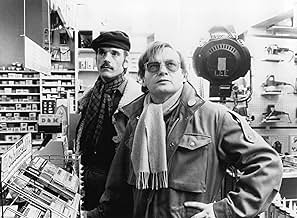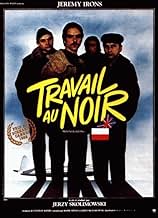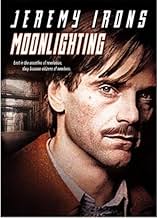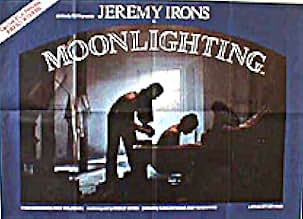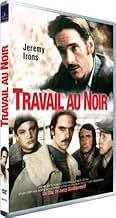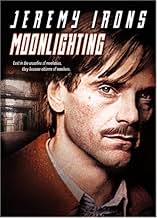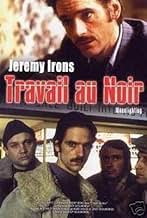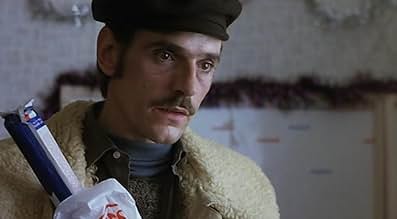IMDb-BEWERTUNG
7,3/10
3747
IHRE BEWERTUNG
Drei polnische Maurer und ihr Vorarbeiter Novak kommen nach London, um unter dem Tisch zu arbeiten.Drei polnische Maurer und ihr Vorarbeiter Novak kommen nach London, um unter dem Tisch zu arbeiten.Drei polnische Maurer und ihr Vorarbeiter Novak kommen nach London, um unter dem Tisch zu arbeiten.
- Regie
- Drehbuch
- Hauptbesetzung
- Auszeichnungen
- 3 Gewinne & 3 Nominierungen insgesamt
Jiri Stanislav
- Wolski
- (as Jirí Stanislav)
Michael Sarne
- Builders' Merchant
- (as Mike Sarne)
Empfohlene Bewertungen
Led by Nowak, the only member of the group with minimal English skills, four Polish contractors arrive in London to gut and refurbish a row house that belongs to their boss back in Warsaw. Heavily laden with tools and carrying only enough cash for materials, bare living expenses, and little entertainment, the four face separation from family and an often hostile English environment. However, the money earned will go a long way in Poland, and their boss will have a renovated London flat at a quarter the cost of using English labor.
Written and directed by Polish playwright Jerzy Skolimowski, "Moonlighting" is a low key film that focuses on the interaction among the four isolated men, who live, work, and sleep in the flat. Nowak, Jeremy Irons in a quiet understated performance, is the only one to regularly venture outside to find food and building materials. Faced with dwindling funds, Nowak devises various methods to shoplift goods or outwit store managers and cleverly double his grocery purchases. While sheer luck often aids Nowak with his dodgy schemes, the English shopkeepers seem remarkably dim, and the immigration officer on arrival at Heathrow was unbelievably gullible.
The story takes place in 1981, the year the film was shot, and, while Nowak struggles with finances and an approaching deadline, Poland stumbles into a military coup, and martial law is imposed. With phone lines cut between London and Warsaw and all flights to Poland canceled, Nowak must conceal the events unfolding at home from his compatriots to keep them focused on finishing the flat. Because three of the four principal actors have few lines and those only in Polish, the film concentrates on Irons, who ably carries the film. Although much of the action takes place inside the flat, Skolimowski's direction manages to avoid a claustrophobic feel. However, "Moonlighting's" leisurely pace does require patience. But Nowak's sharp wits and audacity, fueled by his determination to complete the assigned task despite the mounting odds, make for engrossing viewing. Skolimowski's "Moonlighting" is a small, overlooked film with many rewards for discerning viewers to discover.
Written and directed by Polish playwright Jerzy Skolimowski, "Moonlighting" is a low key film that focuses on the interaction among the four isolated men, who live, work, and sleep in the flat. Nowak, Jeremy Irons in a quiet understated performance, is the only one to regularly venture outside to find food and building materials. Faced with dwindling funds, Nowak devises various methods to shoplift goods or outwit store managers and cleverly double his grocery purchases. While sheer luck often aids Nowak with his dodgy schemes, the English shopkeepers seem remarkably dim, and the immigration officer on arrival at Heathrow was unbelievably gullible.
The story takes place in 1981, the year the film was shot, and, while Nowak struggles with finances and an approaching deadline, Poland stumbles into a military coup, and martial law is imposed. With phone lines cut between London and Warsaw and all flights to Poland canceled, Nowak must conceal the events unfolding at home from his compatriots to keep them focused on finishing the flat. Because three of the four principal actors have few lines and those only in Polish, the film concentrates on Irons, who ably carries the film. Although much of the action takes place inside the flat, Skolimowski's direction manages to avoid a claustrophobic feel. However, "Moonlighting's" leisurely pace does require patience. But Nowak's sharp wits and audacity, fueled by his determination to complete the assigned task despite the mounting odds, make for engrossing viewing. Skolimowski's "Moonlighting" is a small, overlooked film with many rewards for discerning viewers to discover.
Jerzy Skolimowski's "Moonlighting" is an outstanding achievement in many respects. Not only does it contain one of the most fulfilling performances that has ever been put to the screen, but it also serves as a political allegory, a smartly-told drama, and a unique exercise in creating suspense.
On the surface, the story is rather simple: sometime in the early 80's, during the political turmoil that was occurring in Poland, a group of Polish workers emigrate to London to renovate an apartment for their boss. They have no working permits, so they have to do their job with as much secrecy as possible. When Novak (Jeremy Irons), their English-speaking foreman, discovers that military law has been declared in their homeland, he tries to keep it a secret until they are allowed back into the country.
This may not seem like much of a story compared to most modern thrillers. There are no police out to get Novak and his men, nor are there any political opponents out to assassinate them. They are simply there to do their job, and Novak has to make sure they do it effectively and on time. Small but crucial subplots develop out of this: in order to feed himself and his men, Novak has to fake receipts for food (due to the limited amount of money they brought with them), and there are several scenes where he tries to get past the clerks at a grocery store with a Christmas turkey. He also has to buy them clothes and fulfill some of their material demands. On top of that, he also begins to develop fears and worries about his wife back home, including the suspicion that his boss may be having an affair with her. As the story progresses, Novak's money runs lower and his fear and paranoia grows stronger.
Because he is the only one of them who can speak English, Novak is the only one who can communicate with the outside world. But he is also very manipulative, and serves as a symbol of a government that misled their people and kept them ignorant of many of their own problems. It is interesting to see how Skolimowski develops sympathy for poor Novak; for all his intelligence, he is still nothing more than a pawn in the hands of a corrupt government. He is a stranger in a strange land, lost and faking his knowledge of his whereabouts. It would have been difficult to make this film convincing had the lead role not been played to perfection, but Jeremy Irons does it with more grace and skill than any other actor possibly could. Much of his performance is spent in narration, subtly explaining his growing confusion and terror. There are several moments where he keeps a perfectly straight face while rambling on in his head about the grave situation he is in. His performance here holds its own in a year that also included Dustin Hoffman in "Tootsie," Ben Kingsly in "Gandhi," Gerard Depardieu in "Danton," Paul Newman in "The Verdict," Jurgen Prochnow in "Das Boot," and Jack Lemmon in "Missing."
Like Andrej Wajda (who made "Man of Marble" and "Danton"), Jerzy Skolimowski was an outspoken critic of Poland's communist regime. Curiously, he wrote the script in only a little over a day, and the whole production of the film took only a matter of months. Furthermore, the three Polish workers accompanying Novak in the story were actual Polish emigrants living (legally) in Skolimowski's home at the time military law was declared. "Moonlighting" won a well deserved screenplay award at Cannes and was nominated for the Palme d'Or.
This film is on video, but I do not think it is still being circulated. I hope they re-release it on video or DVD someday.
On the surface, the story is rather simple: sometime in the early 80's, during the political turmoil that was occurring in Poland, a group of Polish workers emigrate to London to renovate an apartment for their boss. They have no working permits, so they have to do their job with as much secrecy as possible. When Novak (Jeremy Irons), their English-speaking foreman, discovers that military law has been declared in their homeland, he tries to keep it a secret until they are allowed back into the country.
This may not seem like much of a story compared to most modern thrillers. There are no police out to get Novak and his men, nor are there any political opponents out to assassinate them. They are simply there to do their job, and Novak has to make sure they do it effectively and on time. Small but crucial subplots develop out of this: in order to feed himself and his men, Novak has to fake receipts for food (due to the limited amount of money they brought with them), and there are several scenes where he tries to get past the clerks at a grocery store with a Christmas turkey. He also has to buy them clothes and fulfill some of their material demands. On top of that, he also begins to develop fears and worries about his wife back home, including the suspicion that his boss may be having an affair with her. As the story progresses, Novak's money runs lower and his fear and paranoia grows stronger.
Because he is the only one of them who can speak English, Novak is the only one who can communicate with the outside world. But he is also very manipulative, and serves as a symbol of a government that misled their people and kept them ignorant of many of their own problems. It is interesting to see how Skolimowski develops sympathy for poor Novak; for all his intelligence, he is still nothing more than a pawn in the hands of a corrupt government. He is a stranger in a strange land, lost and faking his knowledge of his whereabouts. It would have been difficult to make this film convincing had the lead role not been played to perfection, but Jeremy Irons does it with more grace and skill than any other actor possibly could. Much of his performance is spent in narration, subtly explaining his growing confusion and terror. There are several moments where he keeps a perfectly straight face while rambling on in his head about the grave situation he is in. His performance here holds its own in a year that also included Dustin Hoffman in "Tootsie," Ben Kingsly in "Gandhi," Gerard Depardieu in "Danton," Paul Newman in "The Verdict," Jurgen Prochnow in "Das Boot," and Jack Lemmon in "Missing."
Like Andrej Wajda (who made "Man of Marble" and "Danton"), Jerzy Skolimowski was an outspoken critic of Poland's communist regime. Curiously, he wrote the script in only a little over a day, and the whole production of the film took only a matter of months. Furthermore, the three Polish workers accompanying Novak in the story were actual Polish emigrants living (legally) in Skolimowski's home at the time military law was declared. "Moonlighting" won a well deserved screenplay award at Cannes and was nominated for the Palme d'Or.
This film is on video, but I do not think it is still being circulated. I hope they re-release it on video or DVD someday.
My main reason for seeing 'Moonlighting' was Jeremy Irons. It was a film that was highly recommended to me being one of the few films of his that was yet to be seen despite meaning to, with those that recommended it saying that it was one of his best performances and films. And considering that he did a lot of fine work pre-'Lolita' (and of course including that performance, which was better than the film), it was something that could not be refused.
Can see whole-heartedly why 'Moonlighting' was so highly recommended, and would do the very same with fellow Jeremy Irons fans who haven't yet seen the film or with anybody looking for a non-UK/US film to watch. It really is deserving of all the praise it gets and is actually deserving of more in my view, actually know a lot of people who haven't even heard of it let alone not seen it and that really should not be the case. Always try to be subjective and hate it when so many people try to force their opinions onto others, but it does irk me sometimes when you have so many heavily marketed films that are sometimes mediocre at best or ones that are good but not that much. And then you have a film as great as 'Moonlighting', one of the best films of its year and of its subject, that despite critical acclaim is not marketed enough. In favour of films that audiences are more likely to see and have concepts and stories that they may be more likely to warm to perhaps. That should not have been, or be, the case, it deserved much better than that.
Yes the deliberate pace may test the patience for some, it is wholly dependent on the viewer, but to me that was not in any way a fault. Do think that the very end could have been rounded off a little more, though the climactic moments are powerful and the final shot is unforgettable.
Visually, 'Moonlighting' looks good. The setting has a lot of atmosphere that fits the tone of the film ideally and it's filmed with grit and style while bringing a claustrophobic edge that helped make things more powerful. Jerzy Skolimowski, exiled at the time, directs assuredly and never loses the vigour. Furthermore the script is an intelligently written one with some humorously satirical moments in deadpan fashion, and while more familiarity with the subject may help the story enthralled, entertained and moved, with a few disturbing twists in the mix like the identity of the only one who knows what's really happening in Poland. The shoplighting sequence is a major highlight, and there is a fair share of tension and poignancy.
Absolutely agree with anybody who says Irons' performance here is one of his finest, both pre-'Lolita' (and then his career became hit and miss when it became increasingly difficult to tell what to do with him or find enough roles that played to his strengths, that's my take though) and ever. It is graceful and understated but also full of authority and not many people are as good as Irons too when it comes to narration. The other performances are all great, but Irons is the one that the viewer remembers.
In conclusion, really great. 9/10
Can see whole-heartedly why 'Moonlighting' was so highly recommended, and would do the very same with fellow Jeremy Irons fans who haven't yet seen the film or with anybody looking for a non-UK/US film to watch. It really is deserving of all the praise it gets and is actually deserving of more in my view, actually know a lot of people who haven't even heard of it let alone not seen it and that really should not be the case. Always try to be subjective and hate it when so many people try to force their opinions onto others, but it does irk me sometimes when you have so many heavily marketed films that are sometimes mediocre at best or ones that are good but not that much. And then you have a film as great as 'Moonlighting', one of the best films of its year and of its subject, that despite critical acclaim is not marketed enough. In favour of films that audiences are more likely to see and have concepts and stories that they may be more likely to warm to perhaps. That should not have been, or be, the case, it deserved much better than that.
Yes the deliberate pace may test the patience for some, it is wholly dependent on the viewer, but to me that was not in any way a fault. Do think that the very end could have been rounded off a little more, though the climactic moments are powerful and the final shot is unforgettable.
Visually, 'Moonlighting' looks good. The setting has a lot of atmosphere that fits the tone of the film ideally and it's filmed with grit and style while bringing a claustrophobic edge that helped make things more powerful. Jerzy Skolimowski, exiled at the time, directs assuredly and never loses the vigour. Furthermore the script is an intelligently written one with some humorously satirical moments in deadpan fashion, and while more familiarity with the subject may help the story enthralled, entertained and moved, with a few disturbing twists in the mix like the identity of the only one who knows what's really happening in Poland. The shoplighting sequence is a major highlight, and there is a fair share of tension and poignancy.
Absolutely agree with anybody who says Irons' performance here is one of his finest, both pre-'Lolita' (and then his career became hit and miss when it became increasingly difficult to tell what to do with him or find enough roles that played to his strengths, that's my take though) and ever. It is graceful and understated but also full of authority and not many people are as good as Irons too when it comes to narration. The other performances are all great, but Irons is the one that the viewer remembers.
In conclusion, really great. 9/10
Moonlighting is an outstanding Polish film which deserves to be listed among top 100 world cinema films.It is a film which shows us that there are some cruel,inhuman,unjust political systems and political establishments who constantly deprive common people of earning their respective livelihoods.Moonlighting demonstrates that human life is full of misery as it can make somebody do things which one would normally not do in daily life.This is the case of a Polish foreman Novak who is in London with three construction workers known to him. For them,their work site appears more of a prison as they cannot go out.Skolimowski is as critical of the plight of clandestine workers as that of Polish government's decision to declare Martial Law.It is sad to learn that according to moonlighting some workers had to work for 18 hours a day.Anxiety,apprehension and confusion are immediately palpable to these people who have landed in London for earning extra money.For example :an airport scene shows Polish workers to be entirely dependent on Novak as he is the only person who speaks English.Touching too are the scenes in which Novak pilfers from a neighborhood supermarket.A word about Sir Jeremy Irons.He is a joy to watch as nobody expected him to play the role of Nowak with amazing inventiveness.
I noticed some time ago that many of the old "At the Movies" shows with Siskel and Ebert are posted on YouTube. Today I watched their Best of 1982 episode and was surprised that Gene Siskel thought "Moonlighting" was the best movie of the year...a film I'd never heard of and which was made very cheaply in the UK. So, I decided to give it a watch.
The story is about four Poles who come to London to work under the table rehabbing an apartment. Why? Well, Polish workers work for a lot less money than English ones and as long as they aren't caught, the scheme will pay off well for everyone. But only one of them (Jeremy Irons) speaks English and the rest spend much of the movie like the Darryls ("Newhart") or Harpo Marx...saying absolutely nothing. As the movie progresses, the more you see that this spokesman is very manipulative...and a most unusual character study of the man.
The story is told VERY economically...with little traditional incidental music and no fancy sets. It looks more like a high quality home movie than a big-time production. I am sure many will dislike the starkness and slow pace of the movie as well as the lack of emotion in the characters. They mostly seem depressed...which is understandable considering what eventually occurs in the picture. But it also makes viewing the film anything but fun.
Overall, this is an okay film which I didn't enjoy nearly as much as Siskel or some of the other reviewers did. Worth seeing? Perhaps...but not if you want a fun or traditional style movie.
The story is about four Poles who come to London to work under the table rehabbing an apartment. Why? Well, Polish workers work for a lot less money than English ones and as long as they aren't caught, the scheme will pay off well for everyone. But only one of them (Jeremy Irons) speaks English and the rest spend much of the movie like the Darryls ("Newhart") or Harpo Marx...saying absolutely nothing. As the movie progresses, the more you see that this spokesman is very manipulative...and a most unusual character study of the man.
The story is told VERY economically...with little traditional incidental music and no fancy sets. It looks more like a high quality home movie than a big-time production. I am sure many will dislike the starkness and slow pace of the movie as well as the lack of emotion in the characters. They mostly seem depressed...which is understandable considering what eventually occurs in the picture. But it also makes viewing the film anything but fun.
Overall, this is an okay film which I didn't enjoy nearly as much as Siskel or some of the other reviewers did. Worth seeing? Perhaps...but not if you want a fun or traditional style movie.
Wusstest du schon
- WissenswertesSkolimowski's Kensington house in West London was in real life undergoing renovation at the time the film was made. (Moonligthing, 1982)
- PatzerWhen one of the workers paints the door frame on the outside of the building and clears away the electrical wire, part of the lintel is already painted white. Later, when Banaszak climbs up the ladder, the lintel has not yet been painted. Then, in the close-up in which he gets the electric shock, a good part of the lintel is painted white again, and in the next shot, when he falls off the ladder, only a tiny part is painted white again.
- VerbindungenFeatured in At the Movies: The Best Films of 1982 (1983)
Top-Auswahl
Melde dich zum Bewerten an und greife auf die Watchlist für personalisierte Empfehlungen zu.
- How long is Moonlighting?Powered by Alexa
Details
- Erscheinungsdatum
- Herkunftsland
- Sprachen
- Auch bekannt als
- Moonlighting
- Drehorte
- Produktionsfirmen
- Weitere beteiligte Unternehmen bei IMDbPro anzeigen
Zu dieser Seite beitragen
Bearbeitung vorschlagen oder fehlenden Inhalt hinzufügen

